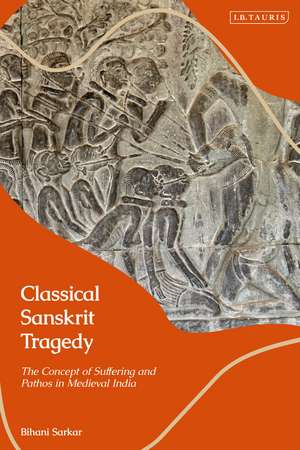Classical Sanskrit Tragedy: The Concept of Suffering and Pathos in Medieval India
Autor Bihani Sarkaren Limba Engleză Paperback – 24 aug 2022
| Toate formatele și edițiile | Preț | Express |
|---|---|---|
| Paperback (1) | 197.24 lei 6-8 săpt. | |
| Bloomsbury Publishing – 24 aug 2022 | 197.24 lei 6-8 săpt. | |
| Hardback (1) | 568.55 lei 6-8 săpt. | |
| Bloomsbury Publishing – 24 feb 2021 | 568.55 lei 6-8 săpt. |
Preț: 197.24 lei
Preț vechi: 257.59 lei
-23% Nou
Puncte Express: 296
Preț estimativ în valută:
37.74€ • 39.33$ • 31.25£
37.74€ • 39.33$ • 31.25£
Carte tipărită la comandă
Livrare economică 03-17 aprilie
Preluare comenzi: 021 569.72.76
Specificații
ISBN-13: 9780755639243
ISBN-10: 0755639243
Pagini: 224
Dimensiuni: 156 x 234 x 16 mm
Greutate: 0.31 kg
Editura: Bloomsbury Publishing
Colecția I.B.Tauris
Locul publicării:London, United Kingdom
ISBN-10: 0755639243
Pagini: 224
Dimensiuni: 156 x 234 x 16 mm
Greutate: 0.31 kg
Editura: Bloomsbury Publishing
Colecția I.B.Tauris
Locul publicării:London, United Kingdom
Caracteristici
Includes translations of Sanskrit poetry never published in English
Notă biografică
Bihani Sarkar is Associate Faculty Member of the Oriental Institute, University of Oxford and Research Member of the Common Room, Wolfson College, University of Oxford. She is the author of Heroic Shaktism: the cult of Durga in Ancient Indian Kingship (2017).
Cuprins
AcknowledgementsPreamble: A note on the Indian medieval.Introduction Part I. The Tragic MiddleIntroduction Part II. Doubt, Obstacle, Deliberation, Death, Disaster: the Trial in Indian AestheticsChapter 1. Kalidasa and his inheritance of griefChapter 2. The Map of Melancholy: Lamentation and the Philosophical PauseChapter 3. On losing and finding love: Conflict, Obstacle and dramaChapter 4. The Altered Heart: Anguish, Entreaty and LyricConclusionBibliography
Recenzii
An erudite book with profound insights into the history of emotions in classical India.
Tragedy-the moral imagination it engages and emotional impact it delivers-has long been considered a unique achievement of Western culture. Sarkar confronts this cliché head on, by a subtle rethinking of the tragic itself-as something experiential rather than formal-and a wide-ranging and acute analysis of classical Sanskrit literature. A searching inquiry into the profound reflections of Indian poets and thinkers on the nature of human existence.
Sarkar gives us a fresh and original reading of Kalidasa's works, these great classics of Sanskrit literature-a new reading that is sensitive and intelligent at the same time. She focuses on the "tragic middle" in these works, presents the reader a study of the revolving wheel of human existence and gives us a finely detailed topography of the map of melancholy. This "tragic middle" is also a study of a severe human crisis in knowing, a rupture in clear awareness, and of the unfolding of recognition. On the other hand, it is a second birth, a maturing and transformative test for the characters. Sarkar's sympathetic and insightful analysis enriches our understanding of the many aspects of tragedy in works of classical Sanskrit literature.
Tragedy-the moral imagination it engages and emotional impact it delivers-has long been considered a unique achievement of Western culture. Sarkar confronts this cliché head on, by a subtle rethinking of the tragic itself-as something experiential rather than formal-and a wide-ranging and acute analysis of classical Sanskrit literature. A searching inquiry into the profound reflections of Indian poets and thinkers on the nature of human existence.
Sarkar gives us a fresh and original reading of Kalidasa's works, these great classics of Sanskrit literature-a new reading that is sensitive and intelligent at the same time. She focuses on the "tragic middle" in these works, presents the reader a study of the revolving wheel of human existence and gives us a finely detailed topography of the map of melancholy. This "tragic middle" is also a study of a severe human crisis in knowing, a rupture in clear awareness, and of the unfolding of recognition. On the other hand, it is a second birth, a maturing and transformative test for the characters. Sarkar's sympathetic and insightful analysis enriches our understanding of the many aspects of tragedy in works of classical Sanskrit literature.
